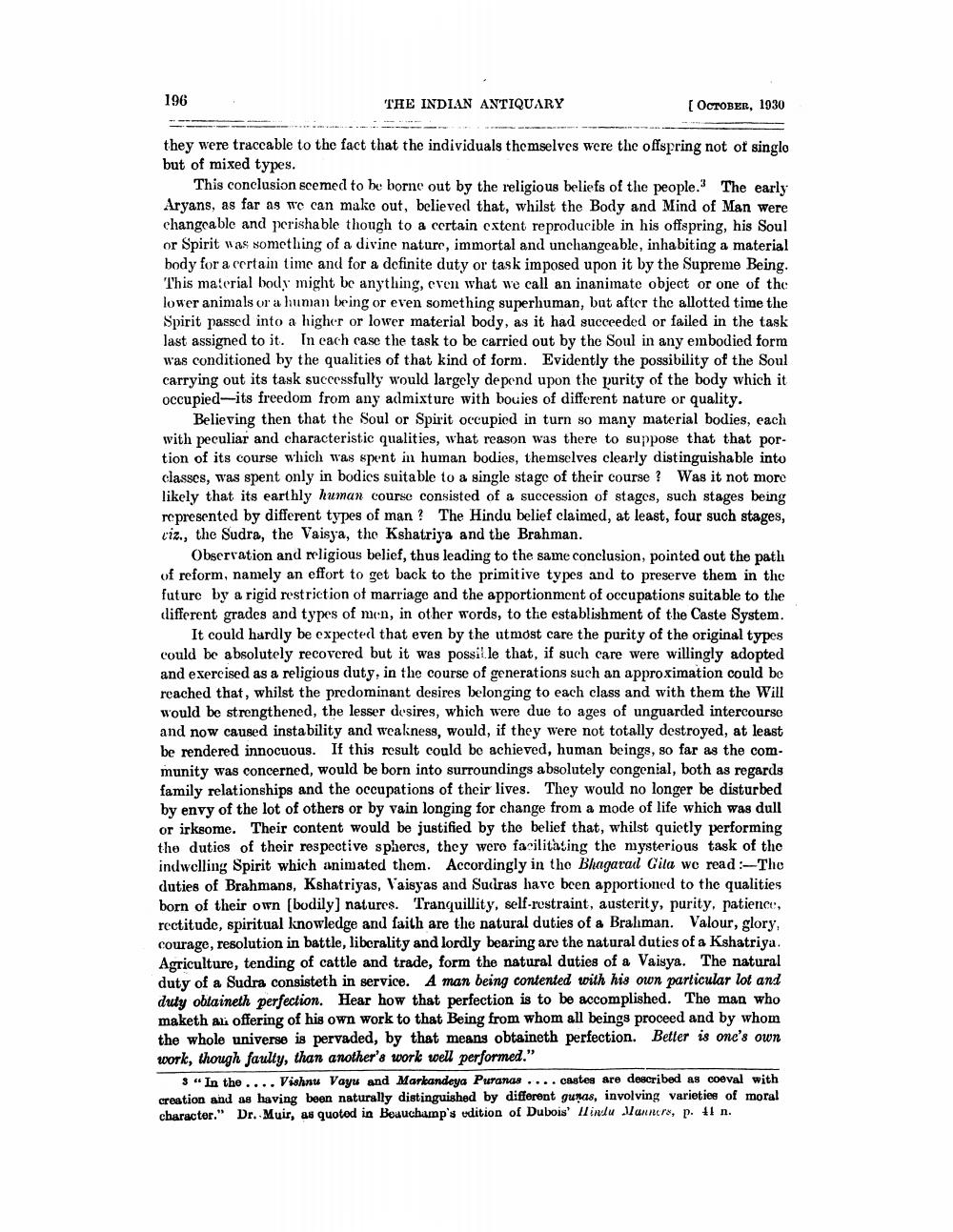________________
196
THE INDIAN ANTIQUARY
[OCTOBER, 1930
they were traccable to the fact that the individuals themselves were the offspring not of singlo but of mixed types.
This conclusion scemed to be borne out by the religious beliefs of the people. The early Aryans, as far as we can make out, believed that, whilst the Body and Mind of Man were changeable and perishable though to a certain extent reproducible in his offspring, his Soul or Spirit was something of a divine nature, immortal and unchangeable, inhabiting a material body for a certain time and for a definite duty or task imposed upon it by the Supreme Being. This material body might be anything, even what we call an inanimate object or one of the lower animals or a human being or even something superhuman, but after the allotted time the Spirit passed into a higher or lower material body, as it had succeeded or failed in the task last assigned to it. In each case the task to be carried out by the Soul in any embodied form was conditioned by the qualities of that kind of form. Evidently the possibility of the Soul carrying out its task successfully would largely depend upon the purity of the body which it occupied-its freedom from any admixture with boules of different nature or quality.
Believing then that the Soul or Spirit occupied in turn so many material bodies, each with peculiar and characteristic qualities, what reason was there to suppose that that portion of its course which was spent in human bodies, themselves clearly distinguishable into classes, was spent only in bodics suitable to a single stage of their course? Was it not more likely that its earthly human course consisted of a succession of stages, such stages being represented by different types of man? The Hindu belief claimed, at least, four such stages, ciz., the Sudra, the Vaisya, the Kshatriya and the Brahman.
Observation and religious belief, thus leading to the same conclusion, pointed out the path of reform, namely an effort to get back to the primitive types and to preserve them in the future by a rigid restriction of marriage and the apportionment of occupations suitable to the different grades and types of men, in other words, to the establishment of the Caste System.
It could hardly be expected that even by the utmost care the purity of the original types could be absolutely recovered but it was possible that, if such care were willingly adopted and exercised as a religious duty, in the course of generations such an approximation could be reached that, whilst the predominant desires belonging to each class and with them the Will would be strengthened, the lesser desires, which were due to ages of unguarded intercourse and now caused instability and weakness, would, if they were not totally destroyed, at least be rendered innocuous. If this result could be achieved, human beings, so far as the community was concerned, would be born into surroundings absolutely congenial, both as regards family relationships and the occupations of their lives. They would no longer be disturbed by envy of the lot of others or by vain longing for change from a mode of life which was dull or irksome. Their content would be justified by the belief that, whilst quietly performing the duties of their respective spheres, they were facilitating the mysterious task of the indwelling Spirit which animated them. Accordingly in the Bhagarad Cila we read :- The duties of Brahmans, Kshatriyas, Vaisyas and Suciras have been apportioned to the qualities born of their own [bodily) natures. Tranquillity, self-restraint, austerity, purity, patience, rectitude, spiritual knowledge and faith are the natural duties of a Brahman. Valour, glory, courage, resolution in battle, liberality and lordly bearing are the natural duties of a Kshatriya. Agriculture, tending of cattle and trade, form the natural duties of a Vaisya. The natural duty of a Sudra consisteth in service. A man being contented with his own particular lot and duty obtaineth perfection. Hear how that perfection is to be accomplished. The man who maketh an offering of his own work to that Being from whom all beings proceed and by whom the whole universe is pervaded, by that means obtaineth perfection. Better is one's own work, though faulty, than another's work well performed."
3 "In the .... Vishnu Vayu and Markandeya Puranas .... castes are described as coeval with creation and as having been naturally distinguished by different gunas, involving varieties of moral character." Dr. Muir, as quoted in Beauchamp's udition of Dubois' Hindu Vanners, p. 41 n.




